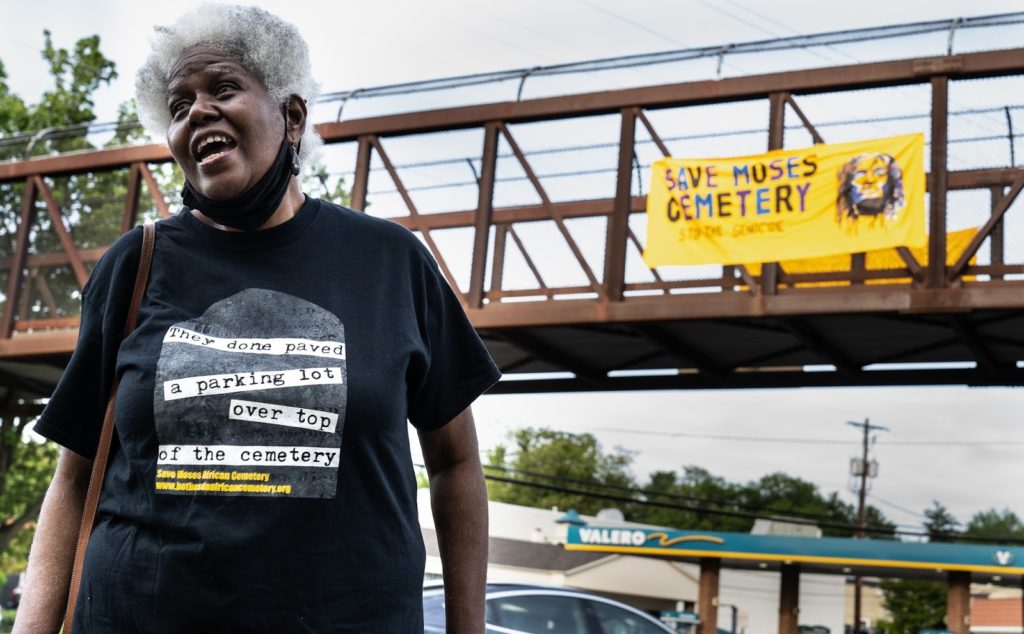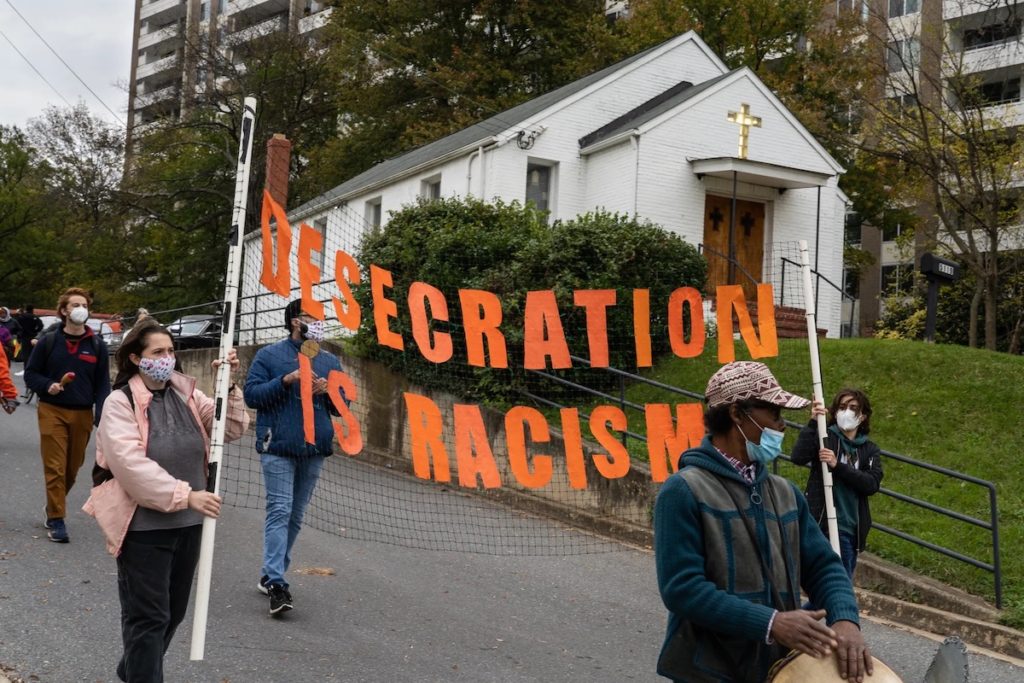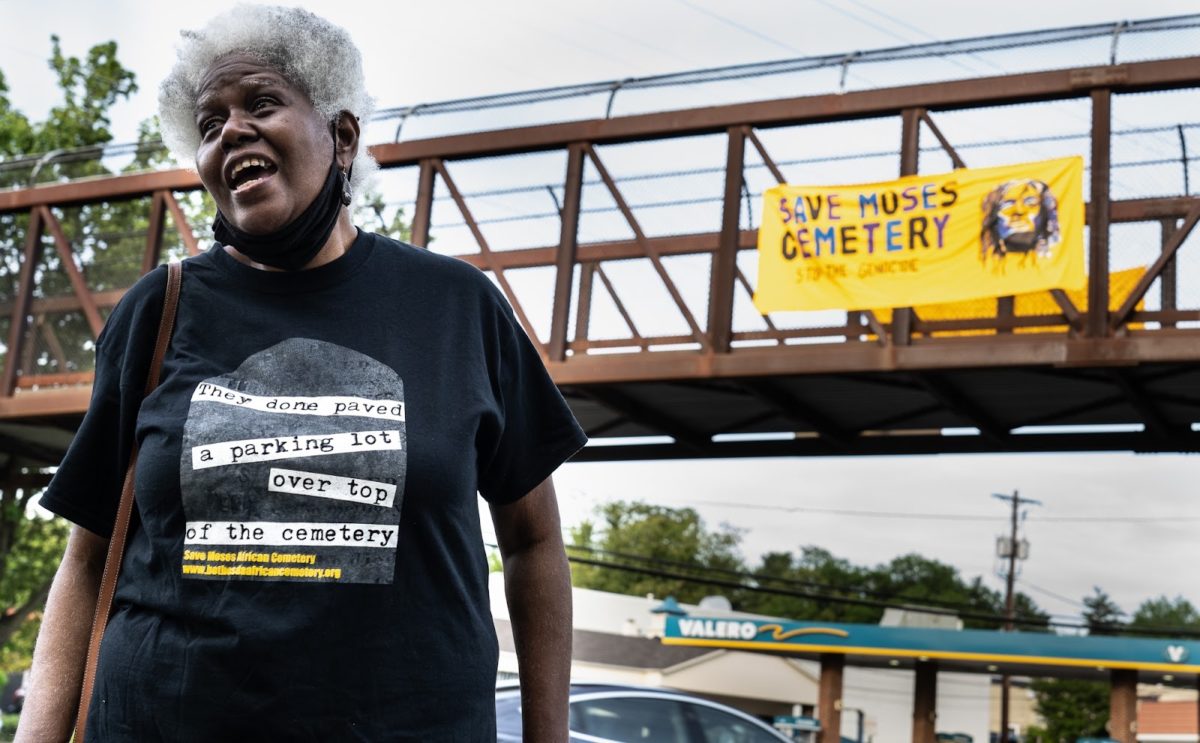Photo: Gail Rebhan, used with permission.
The desecration of the Moses African Cemetery and other African burial sites in Montgomery County, Maryland has been an ongoing crime for at least the last century. Six years ago, a struggle began on River Road in Montgomery County, Maryland, against two agencies: the Maryland National Capital Parks and Planning Commission and the Housing Opportunities Commission. The agencies planned to sell the land of the Moses African Cemetery, a site where hundreds of African and African American ancestors are buried, to developers. This news prompted the Social Justice Ministry of the Baptist Church of Macedonia, a church located across from the cemetery, to form the Bethesda African Cemetery Coalition. The Coalition is a multi-ethnic, multinational and multi-generational organization committed to protecting ancestors from further desecration.
For years, BACC has worked tirelessly to uncover the history of River Road and to educate the surrounding community through public education campaigns and events held at the cemetery. The Coalition has published a book on the cemetery and a second book is due out later this year. They built a mobile exhibit to take to different community events around the county, with a huge exhibit planned at American University’s Katzen Arts Center in June of this year. Through years of direct and legal action, they succeeded in preventing the construction of a storage unit on the cemetery, preventing the sale of the cemetery to three different venture capitalists and capturing evidence of serious looting. , profanations and hate crimes that have occurred on the site.
The Coalition plans to keep fighting until the land is returned to the church, ensuring the graves are never disturbed again. They also demand that each person responsible for the desecration be held accountable to the fullest extent of the law.
According to Dr. Marsha Coleman-Adebayo, President of the Bethesda African Cemetery Coalition, “Desecration is a violent, political, cultural and spiritual act, perpetuated by those who wield political and economic power and are committed to erasing the legacy , meaning, history and ancestry. of the oppressed to dominate and hold hegemonic power. The purpose of desecration is to launder and plunder sacred land in order to transfer wealth from vulnerable groups to the landed aristocracy.
The Untold Story of River Road
River Road, or Maryland Route 190, runs approximately 17 miles along the Potomac River in Maryland and Washington, D.C. The road primarily passes through rural and suburban areas of Montgomery County but terminates in the urban area of Bethesda , Maryland. Like many counties adjacent to DC, Montgomery County is one of the richest in the countryside.
The history of the River Road African Community in Bethesda dates back to the 17th and 18th centuries, when human traffickers began kidnapping humans from advanced civilizations in West and Central Africa to force them to work on plantations. wealthy white landowners. Not only did the European colonizers enslave and torture these Africans, but the landowners also learned a great deal about natural medicine, hydrology, agriculture and political organization by forcing those who were enslaved to pass on this knowledge.
When tobacco crops wreaked havoc on the soil to the point that it became unusable, some plantation owners began shifting their business model to “herding schemes”, where they forced young girls to be raped and give birth to more human beings who could be sold. , exchanged and forced to work. Many of these girls died during childbirth. If they did not die, they were sold to cotton plantations in the South and were often raped again throughout the journey. Evidence of forced births and mass graves on River Road comes from plantation records which show a disproportionate number of young girls – and their early deaths – in the area in the 1800s.
From the 1850s freed Africans were only allowed to settle in the River Road area where the slave barracks and mass graves were located. After emancipation, a “colored school” was established for the many African families who had settled in the area. Black families who owned land in the area donated some of their land to the school. In 1954, after schools were desegregated in Brown v. Board of Education, the school was closed and the county gave the land to white families.
The Maryland National Capital Park and Planning Commission, or MN-CPPC, has overseen much of the racist black land transfer in the state. The department was founded in 1927 with great encouragement from white supremacist politician and developer, Colonel Edward Clark Leewhich used to use racial covenants in its suburban development.
In the mid-20th century, the MN-CPPC began to develop the lands where the River Road community resided using violent and racist tactics. They rezoned the area where black families lived as industrial workers, enforcing industrial regulations to evict families from residential areas. They coerced the owners with alcohol and told them they had to sell their homes below market value. If they didn’t, the houses would be condemned and they would have to move out anyway. The Ku Klux Klan launched terror campaigns in the area, driving through black neighborhoods at night and burning homes. One of the members of the Bethesda African Cemetery Coalition, Harvey Matthews, says he had to huddle with his family in the dark during KKK “Black Out” parties.

The struggle continues
Today, the only visible remnant of the African American community on River Road is the Macedonian Baptist Church. Beneath the ground are hundreds, if not thousands, of graves interring the remains of Africans and African Americans. These ancestors have been denied proper rest due to the continued desecration of the land in the 21st century. Moreover, their descendants were denied the right to manage the sacred resting place.
BACC has built an uncompromising and organized movement for black ancestors that has rocked Montgomery County, one of the wealthiest counties in the nation, for the first time in recent history. In the summer of 2020, Coalition organizers blocked construction trucks outside Moïse three days a week to prevent any construction on the cemetery. Teams of Coalition photographers and videographers monitored the cemetery for days on end to ensure that any disturbance caused by construction crews was documented. Images of construction workers carrying possible funeral bottles to the car are just one example of a series of egregious images the team has captured. When huge trucks began hauling huge piles from the cemetery to unmarked ground towards what organizers describe as “the middle of nowhere”, the team followed the trucks and dug into the dirt until until the ancestors are crushed by machines. In just thirty minutes, they found various hairpins, funerary ceramics and bone fragments. Despite the BACC presenting an abundance of evidence to local government leaders, both political parties in Montgomery County have turned their backs on the descendant community.
Organizers are pressing Democratic county leader and self-proclaimed “progressive” Marc Elrich, who when elected ensured coalition peace and an end to racist desecration. However, as Elrich himself admitted, he never had any real plans to fight for Moses’ cemetery to be returned to the descendant community. Instead, Elrich now claims he can’t do anything about the desecration. Organizers are asking Elrich to claim eminent domain on behalf of the privately owned cemetery. As for the part of the cemetery owned by the Housing Opportunities Commission and Parks and Planning, organizers are asking Elrich to withdraw funding from these Jim-Crow-era departments until they return the cemetery to its rightful owners.
The fight for the cemetery of Moses is not unique. Cemetery organizations across the country have reached out to the Bethesda African Cemetery Coalition to show solidarity and shine a light on their own struggles to preserve and claim their sacred burial grounds.
At the heart of this problem, according to BACC, is land. Montgomery County, since its inception, has worked to ensure that black people do not own land and therefore have no power. Dr. Marsha Coleman-Adebayo says, “If you have land, you have wealth. In a capitalist system, wealth means power.
Readers can find more information about the Bethesda African Cemetery Coalition’s website.


